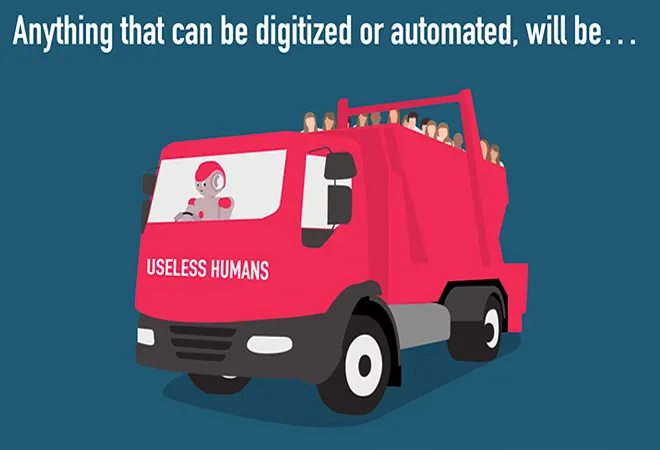
The world is changing fast, if GDP growth is a proxy for change, then India is changing the fastest. I want my daughter as she grows up to acquire the best set of experiences and skills to succeed professionally in this rapidly changing 21st century. Every parent wishes to be a great parent. Let’s assume I am going to be, but what else should I wish for her to maximise her professional success? To answer this, one must ask: what will the future of work look like and what will be required to be successful?
There are lots of articles and forums which pontificate jargon; sometimes fearful and sometimes utopian about the future economy and work. While the extent and nature of change is uncertain, what we can be sure of, is that work in the future will be characterised by:
- Smart Machines – Artificial Intelligence, automation and big data will increasingly make most thinking tasks redundant. That is, the capabilities of machines now extend beyond automating lower-skilled professions like truck drivers, to more technically complex professions and tasks such as medical diagnosis and financial management.
- Flexibility – decadal long middle class corporate jobs are a 20th century enigma. We will go back to the future, where all professionals are their own businesses, their own brand and their own craftsperson.
- The Economic Centre of Gravity Returning to Middle Civilisations – from 1AD to 1800 China and India accounted for 50 percent of world GDP. Halfway through last century it stood at 10 percent, by the end of this century most predict it will again reach 50 percent. The protectionism of Trump is an attempt to turn back the ocean currents, while Brexit is an attempt to jump ship before it sinks.
- Polarisation and Exclusivity – smart machines will mean the end of middle skill jobs, leaving two poles of high and low skill jobs. Capital will accumulate – as return on investments exceeds economic growth, the proportion of GDP accruing to capital will expand, excluding non-capital owners. We don’t have a solution to this other than government intervention or protection.
One of the key questions is then: how will humans distinguish themselves in a world in which technical skills are constantly on the verge of redundancy by a smart bot?
The answer--soft skills. Emotional intelligence, leadership, cross cultural competency, inter-disciplinariarity, and adaptive and creative problem solving will be skills that elevate a global professional to a role akin to an orchestra conductor. In practice this means the ability to very quickly enable humans and machines to work together productively anywhere in the world on constantly evolving challenges.
So how did we get here…
Scholars like Baldwin argue that the industrial revolution meant a quantum change in the implementation of know-how (factories) to efficiently produce high value goods.
<1> This coincided with the elimination of trade costs (moving goods), enabling these goods to have global markets. The economic pie as a result, grew massively, but accrued only to nations that kept the know-how (the west), leading simultaneously to a wage premium among lower-skilled local western workers.
This is why last century millions of Indians went abroad to access that know-how and the wage premium, and didn’t return. However over the last 3 or 4 decades communication costs (moving ideas) have reduced and the know-how (factories) have moved to more competitive nations with equally skilled labour such as India and China. This is why millions of Indians today are returning from early careers abroad and fewer are leaving.
However, humankind has not yet eliminated face to face costs (moving “trust”). Trust is required for two people who have never met to instantly and seamlessly work efficiently together on new activities; the more complex and uncertain the task, the more trust is critical for productivity. Telepresence and emerging technology helps, but there is something primal about face to face interactions for establishing that trust. That is why, for instance, air travel for business is sky rocketing.
Soft skills and accelerating trust (face to face costs) are two sides of the same coin and will distinguish professional success in the future. As a parent, the question for me is then: how does my daughter best accumulate these and where?
Conventional wisdom would suggest a western focus. Top western education institutions still dominate the world. While formal education will be less of a professional distinguisher in the future, it will remain a pre-requisite and foundation. However, the value of top western institutions is increasingly shifting towards its ability to provide a global hub for non-class room, cultural interactions and networking (learning to accelerate trust). One should be cautious that these cultural interactions are global and not simply focused on a declining western market; for example children learning French today is a bit like learning Latin two centuries ago. Conventional thinking would also suggest creative thinking, emotional intelligence and culturally transferable leadership skills might be better attained via a western upbringing. That said, the pervasion of decadent, self-indulgent behaviour in a western upbringing doesn’t necessarily foster a drive for continuous learning and adaptation.
The case for an Indian focus would be premised on the notion that it’s easier to succeed professionally in a growing market, and India’s enviable growth trajectory would suggest a tailwind for those that focus on India. India’s top education institutions can increasingly match western institutions on the world stage, but struggle as a global hub of cultural interactions. Whilst Indian formal institutes may be technically focused, Indian society has a rich tradition of learning, creative and adaptive problem solving and being culturally heterogeneous.
Literature supports the idea that a person’s core soft skills are predominantly shaped in childhood: fostering curiosity drives learning; empowerment enables leadership; conversation creates emotional intelligence; diverse experiences and diverse people incubates adaptability and creativity. This suggests ‘It’s the parenting – stupid’ and don’t stress about formal institutions.
For my daughter, perhaps a portfolio approach may be the best hedge. Perhaps, rather than outsourcing soft skill acquisition to institutions, or just wishing it upon myself, the best for my daughter would be me focusing time on truly ‘being’ a great parent.
<1> Richard Baldwin,
The Great Convergence, (Harvard Press 2016)
The views expressed above belong to the author(s). ORF research and analyses now available on Telegram! Click here to access our curated content — blogs, longforms and interviews.



 The world is changing fast, if GDP growth is a proxy for change, then India is changing the fastest. I want my daughter as she grows up to acquire the best set of experiences and skills to succeed professionally in this rapidly changing 21st century. Every parent wishes to be a great parent. Let’s assume I am going to be, but what else should I wish for her to maximise her professional success? To answer this, one must ask: what will the future of work look like and what will be required to be successful?
There are lots of articles and forums which pontificate jargon; sometimes fearful and sometimes utopian about the future economy and work. While the extent and nature of change is uncertain, what we can be sure of, is that work in the future will be characterised by:
The world is changing fast, if GDP growth is a proxy for change, then India is changing the fastest. I want my daughter as she grows up to acquire the best set of experiences and skills to succeed professionally in this rapidly changing 21st century. Every parent wishes to be a great parent. Let’s assume I am going to be, but what else should I wish for her to maximise her professional success? To answer this, one must ask: what will the future of work look like and what will be required to be successful?
There are lots of articles and forums which pontificate jargon; sometimes fearful and sometimes utopian about the future economy and work. While the extent and nature of change is uncertain, what we can be sure of, is that work in the future will be characterised by:
 PREV
PREV


